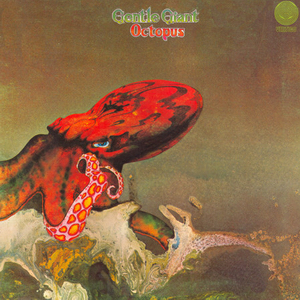Top Qs
Timeline
Chat
Perspective
Octopus (Gentle Giant album)
1972 studio album by Gentle Giant From Wikipedia, the free encyclopedia
Remove ads
Octopus is the fourth studio album by British progressive rock band Gentle Giant, released in 1972 through Vertigo in Europe and though Columbia in North America. It was the band's last album which all the Shulman brothers involved together in the band, as the founding member Phil Shulman left the band after the release, and the first album with new drummer John Weathers, who remained with the band until their dissolution in 1980. Octopus remains a highly regarded example of the progressive rock genre and is generally considered to represent the start of the band's peak period.[citation needed]
Remove ads
Background and release
Octopus was allegedly named by Phil Shulman's wife Roberta[citation needed] as a pun on "octo opus" (eight musical works, reflecting the album's eight tracks).[4]
On 30 October 2015, a Steven Wilson remix was released on CD/Blu-ray via the band's Alucard label. Three tracks (1, 2 & 5)[5] could not be discretely remixed since one multi-track reel was missing. Instead, those three tracks were upmixed to 5.1 surround using the Penteo surround software. The remaining five tracks were remixed to 5.1 by Steven Wilson.[6]
Remove ads
Music and lyrics
Octopus maintained Gentle Giant's trademark of broad and challenging integrated styles. The album's tracks have been described as "stylistically and sonically all over the place but always in control."[7] One of the highlights was the intricate madrigal-styled vocal workout "Knots". The album's lyrics are generally based on literature and philosophy: "The Advent of Panurge" is inspired by the books of Gargantua and Pantagruel by François Rabelais; "A Cry for Everyone" is inspired by the work and beliefs of the French writer Albert Camus, while the song "Knots" is inspired by the book Knots by the Scottish psychiatrist R. D. Laing.
Remove ads
Artwork
The UK release by Vertigo featured art by Roger Dean. Dean's logo appears inside the lyrics booklet.[citation needed]
US and Canadian releases were released by Columbia and used a different cover by Charles White. Early versions of this cover were die-cut into a jar shape.[citation needed]
Critical reception and legacy
Summarize
Perspective
Later reviews about the album have remained positive. AllMusic said that Octopus is "an album that has withstood the test of time a lot better than anyone might have expected."[8]
In the Q & Mojo Classic Special Edition Pink Floyd & The Story of Prog Rock, the album came #16 in its list of "40 Cosmic Rock Albums".[9] In The 100 Greatest Prog Albums Of All Time, by ProgMagazine, Octopus stands at number 65.[10]
In 2004, Ray Shulman commented: "(Octopus) was probably our best album, with the exception, perhaps of Acquiring the Taste. We started with the idea of writing a song about each member of the band. Having a concept in mind was a good starting point for writing. I don't know why, but despite the impact of The Who's Tommy and Quadrophenia, almost overnight concept albums were suddenly perceived as rather naff and pretentious."[citation needed]
In 2013, progressive death metal band Witherscape covered the track "A Cry for Everyone", and issued it for release on their The Inheritance album.[11]
The 2015 reissue of the album, mixed by Steven Wilson, entered the BBC Rock Chart at No. 34.[12]
In 2023, John Cunningham of WhatCulture wrote: "While some may argue Acquiring the Taste is the group's magnum opus, Gentle Giant was the trailblazer. An unwieldy but incredibly catchy and creative instalment in the genre's mid '70s boom period."[13]
Remove ads
Track listing
All tracks are written by Kerry Minnear and Ray Shulman (music); lyrics jointly written by Derek Shulman and Phil Shulman (according to the 2015 Steven Wilson remix).
Remove ads
Personnel
Summarize
Perspective
- Gentle Giant
- Gary Green - electric guitar (tracks 1, 3, 4, 5, 8), acoustic guitar (track 6), percussion
- Kerry Minnear - piano (tracks 1–5, 7, 8), Hammond organ (tracks 1–5, 7, 8), Moog synthesizer (tracks 1, 3–5, 8), electric piano (tracks 2, 4, 8), Mellotron (tracks 2, 7, 8), Clavinet (track 1, 4), regal (track 6), vibraphone (tracks 4, 8), cello (tracks 2, 6), percussion, lead vocals (tracks 1, 4 and 7), backing vocals
- Derek Shulman - lead vocals (tracks 1–4, 8), alto saxophone (track 5)
- Phil Shulman - trumpet (tracks 1, 2), tenor saxophone (tracks 4, 5), baritone saxophone (track 4), mellophone (track 7), lead vocals (tracks 1, 4, 6 and 8), backing vocals
- Ray Shulman - bass guitar, violin (tracks 2, 5, 6), viola (tracks 2, 6), electric violin (tracks 4, 8), acoustic guitar (track 6), percussion, backing vocals
- John Weathers - drums (tracks 1–5, 7, 8), bongos (tracks 3, 8), varispeed cymbal (tracks 4, 8), xylophone (tracks 4, 6)
Production
- Gentle Giant - Production
- Martin Rushent - Engineering
- Cliff Morris - Mastering
- Geoff Young - Tape operator
- Murray Krugman - Over-all American Supervision
Design
- Roger Dean - Illustration & Art (UK)
- John Berg - Cover concept & design
- Fluid Drive - Art (US)
- Charles White III - Illustration (US)
- Kenny Kneitel - Design
- Michael Doret - Lettering
Remove ads
Charts
Release history
Literature
- Sivy, Robert Jacob (2016). Philippe Gonin (ed.). "Interwoven Patterns and Mutual Misunderstandings: Binding R.D. Laing's Psychology with Gentle Giant's Knots". Prog Rock in Europe: Overview of a persistent musical style. Dijon: Éditions universitaires de Dijon: 131–143. ISBN 9782364411753. (Conference journal. Analysis of the song Knots)
References
Wikiwand - on
Seamless Wikipedia browsing. On steroids.
Remove ads


